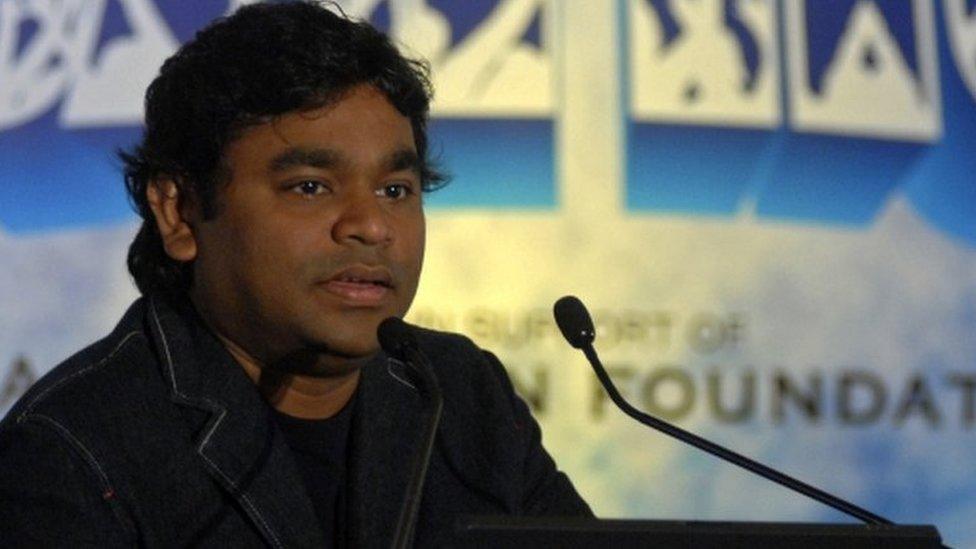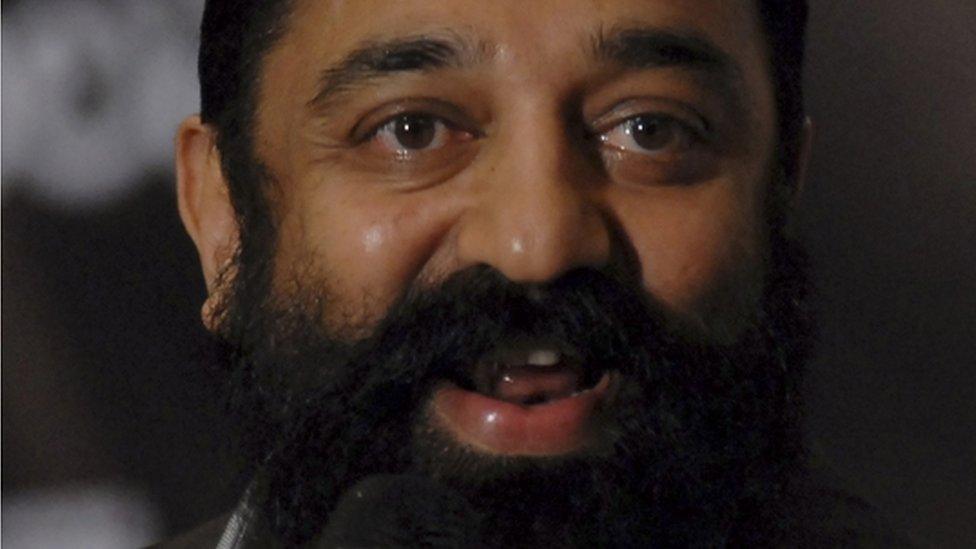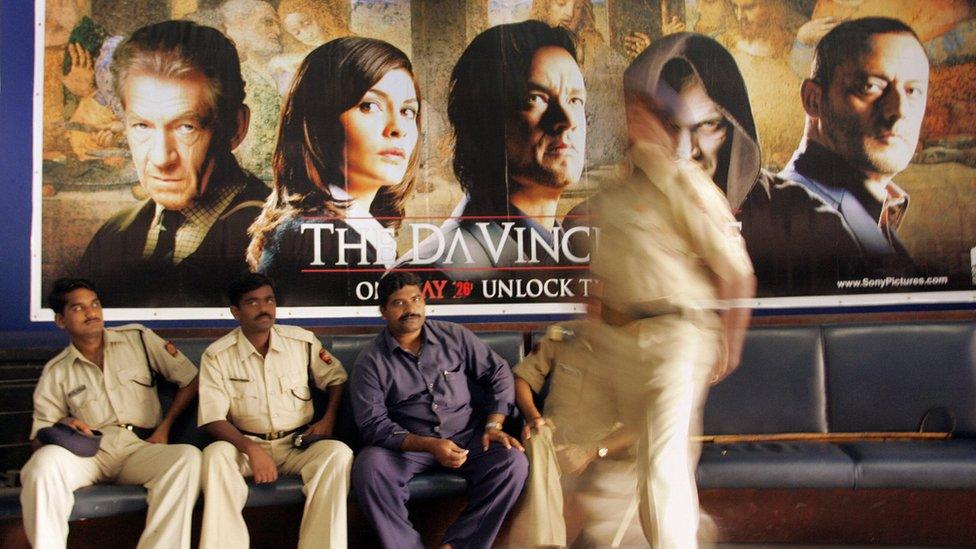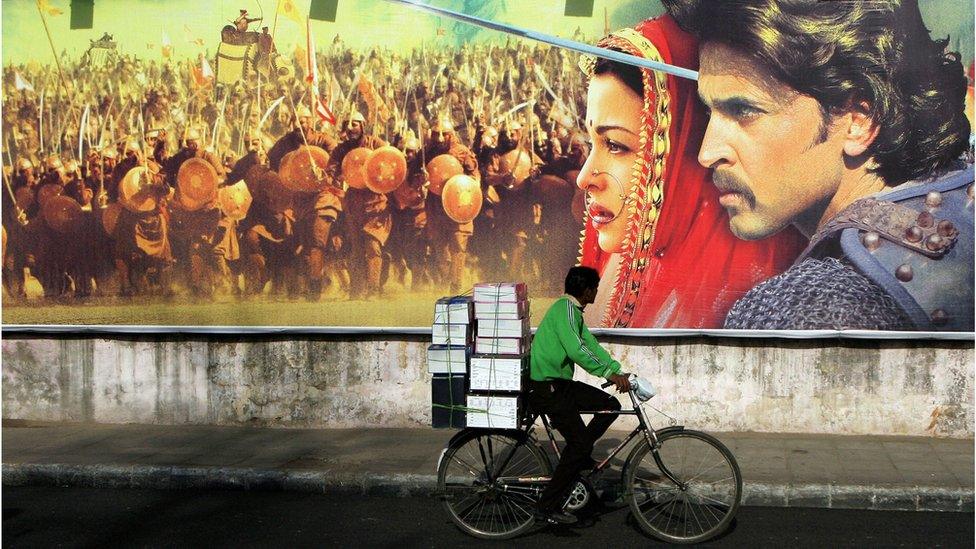India's AR Rahman responds to 'fatwa' on Muhammad film
- Published

Rahman is an Oscar winning composer
Indian musician and composer AR Rahman has responded to criticism against him for composing music for a film on Prophet Muhammad.
Rahman's response which he posted on Facebook, external said he composed the music in "good faith".
The Raza Academy, external in Mumbai said it issued a "fatwa" against Rahman and the Iranian director of the film Majid Majidi.
The institute also wrote to the Indian government, seeking a ban on the film.
The Oscar winning composer and musician was born a Hindu, but converted to Islam in 1989 at age 23, changing his name from RS Dileep Kumar to Allah Rakha Rahman.
Correspondents say his decision to make a public statement on Facebook is interesting, given that the musician generally steers clear of media interviews and talking about his beliefs. Although Rahman is active on social media, he usually uses it to promote his latest work or to point people to other interesting compositions.
In his statement Rahman said, "What, and if, I had the good fortune of facing Allah and He were to ask me on Judgement Day: I gave you faith, talent, money, fame and health... why did you not do music for my beloved Muhammad film? A film whose intention is to unite humanity, clear misconceptions and spread my message that life is about kindness, about uplifting the poor, and living in the service of humanity and not mercilessly killing innocents in my name."

Films that 'hurt' religious sentiments in India

Kamal Haasan agreed to edit seven scenes in the film
Viswharoopam
Vishwaroopam, starring Tamil superstar Kamal Haasan, was banned, external in the south Indian state of Tamil Nadu, Mr Haasan's biggest market, after several Muslim organisations said it depicted the community in a negative light.
State Chief Minister Jayalalitha said that the ban was necessary to maintain law and order.
After calling it an attack on the freedom of expression and threatening to leave Tamil Nadu and live elsewhere, Haasan was allowed to release his film after coming to a compromise with religious leaders where he agreed to edit seven scenes.

The Da Vinci Code was banned in several Indian states
The Da Vinci Code
The film was banned in several Indian states, including Nagaland and Punjab, after Catholic groups in the country protested against its release.
The film, based on the best seller by Dan Brown, claimed the Catholic church had conspired to conceal what the Holy Grail really was, and that Jesus had married Mary Magdalene and had a line of descendants that survived to this day.
A statement , externalissued by the Tamil Nadu government said the release of the film, which portrays Jesus as a married man, might "lead to demonstrations and disrupt peace and tranquillity" in the state.

Jodhaa Akbar is based on the life of Mughal emperor Akbar and his romance with a Rajput princess
Jodhaa Akbar
An Indian historical epic based on the life of Mughal emperor Akbar and his romance with a Rajput princess, the film was not released in Rajasthan, external after Rajput groups claimed that it was a "distortion of historical facts".
Cinema owners had also received letters written in blood by a Rajput caste organisation called the Karni Sena.

Majid Majidi's film, Muhammad: Messenger of God, does not depict the face of the Prophet, but reportedly includes shots, external of the Prophet's back, via a low-angle shot of a teenage Muhammad against the sky, and his hands and legs as a baby.
"Firstly, the name of the Prophet shouldn't be in the film's title. People use a film's name loosely, like when someone says bad things about the film, it sounds like an insult to Muhammad himself. Secondly, photography isn't allowed in Islam. We have a problem with various actors shown playing Muhammad," a statement from the Raza Academy read, external.
It further said that Rahman would need to solemnise his marriage again and also read the Kalma , externalonce more.
Rahman's response to the criticism has gained massive traction on social media, garnering more than 32,000 likes and 3000 shares. Most of the comments - from both Hindus and Muslims - have expressed support for him.